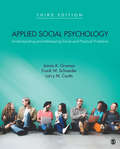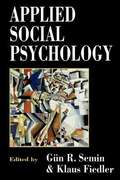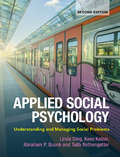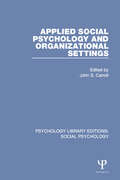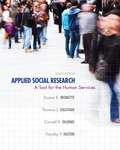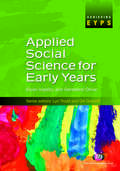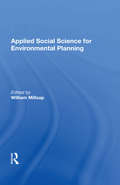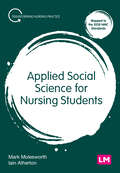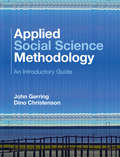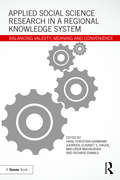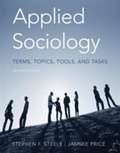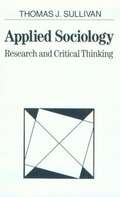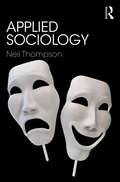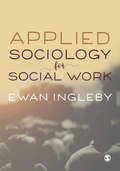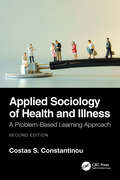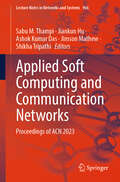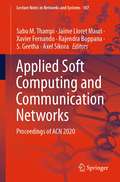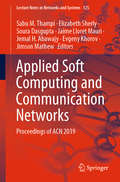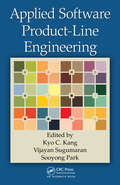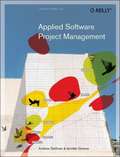- Table View
- List View
Applied Social Psychology: Understanding and Addressing Social and Practical Problems
by Frank W. Schneider Jamie A. Gruman Larry M. CouttsThis student-friendly introduction to the field focuses on understanding social and practical problems and developing intervention strategies to address them. Offering a balance of theory, research, and application, the updated Third Edition includes the latest research, as well as new, detailed examples of qualitative research throughout. The book begins with separate chapters that define the field, examine social psychological theory, review research methods, and consider the design and evaluation of interventions. Subsequent content chapters focus on the application of social psychological theory and knowledge to such areas as counseling, sports, media, health, education, organizations, criminal justice, community, environment, and diversity.
Applied Social Psychology: Understanding and Addressing Social and Practical Problems
by Frank W. Schneider Jamie A. Gruman Larry M. CouttsThis student-friendly introduction to the field focuses on understanding social and practical problems and developing intervention strategies to address them. Offering a balance of theory, research, and application, the updated Third Edition includes the latest research, as well as new, detailed examples of qualitative research throughout. The book begins with separate chapters that define the field, examine social psychological theory, review research methods, and consider the design and evaluation of interventions. Subsequent content chapters focus on the application of social psychological theory and knowledge to such areas as counseling, sports, media, health, education, organizations, criminal justice, community, environment, and diversity.
Applied Social Psychology
by Gun R. Semin Klaus FiedlerThis comprehensive textbook overviews the applications of social psychology to a wide range of problems and issues in contemporary society. With internationally respected contributors who survey the major developments in their fields, this practical guide incorporates advice, examples and reading lists.
Applied Social Psychology
by Linda Steg Abraham P. Buunk Talib Rothengatter`I think this is a wonderful book. The social psychological theories are exceptionally well presented for practical use. Anyone studying social psychology will find this book extremely relevant and accessible' - Gerjo Kok, Professor of Applied Psychology, Department of Work and Social Psychology, Maastricht University `This is a highly readable book dealing with an exciting topic, applied social psychology, which is at the heart of many urgent problems of the new millennium. It is well suited for curing the disease of those who still believe there is an opposition between fundamental and applied research, between theories and practice. The major asset of this volume lies in the originality and strength of the PATH concept -- from problem definition, over analysis, and test, to helping. I like the idea to implement and institutionalize this framework in teaching and in education' - Klaus Fiedler, University of Heidelberg Introducing a new methodological approach for doing applied psychology, the PATH model, this book offers a simple, systematic, step-by-step, easy-to-use methodology for applying primarily social psychological theory to a wide range of social problems, from tackling crime and prejudice to fostering environmental conservation and team performance. It helps and guides students to define a problem, conduct a theory-based analysis, develop an explanatory model, set up and execute a research project to test the model, and develop an intervention. Applying Social Psychology is a highly practical text, which can be used by introductory and advanced level students who want to learn how to analyze practical problems and develop solutions for these problems based upon social psychological theory and research. Written in an engaging and accessible way, this book offers: 1. A new methodological model put forward by the authors (PATH model); 2. Real world case studies; 3. End of chapter exercises; 4. Interviews with leading social psychologists; 5. Glossary of key theories and concepts in social psychology; 6. Recommended further reading.
Applied Social Psychology
by Linda Steg Kees Keizer Buunk Abraham P. Talib Rothengatter`I think this is a wonderful book. The social psychological theories are exceptionally well presented for practical use. Anyone studying social psychology will find this book extremely relevant and accessible' - Gerjo Kok, Professor of Applied Psychology, Department of Work and Social Psychology, Maastricht University `This is a highly readable book dealing with an exciting topic, applied social psychology, which is at the heart of many urgent problems of the new millennium. It is well suited for curing the disease of those who still believe there is an opposition between fundamental and applied research, between theories and practice. The major asset of this volume lies in the originality and strength of the PATH concept -- from problem definition, over analysis, and test, to helping. I like the idea to implement and institutionalize this framework in teaching and in education' - Klaus Fiedler, University of Heidelberg Introducing a new methodological approach for doing applied psychology, the PATH model, this book offers a simple, systematic, step-by-step, easy-to-use methodology for applying primarily social psychological theory to a wide range of social problems, from tackling crime and prejudice to fostering environmental conservation and team performance. It helps and guides students to define a problem, conduct a theory-based analysis, develop an explanatory model, set up and execute a research project to test the model, and develop an intervention. Applying Social Psychology is a highly practical text, which can be used by introductory and advanced level students who want to learn how to analyze practical problems and develop solutions for these problems based upon social psychological theory and research. Written in an engaging and accessible way, this book offers: 1. A new methodological model put forward by the authors (PATH model); 2. Real world case studies; 3. End of chapter exercises; 4. Interviews with leading social psychologists; 5. Glossary of key theories and concepts in social psychology; 6. Recommended further reading.
Applied Social Psychology and Organizational Settings (Psychology Library Editions: Social Psychology)
by John S. CarrollOriginally published in 1990, this title presents work that bridges social psychology and organizations. The primary goal is understanding, but that goal has two opposite sides: understanding organizations by bringing to bear the concepts and methods of social psychology (along with other social sciences), and understanding and developing social psychology by confronting it with the phenomena of actual organizational life. As such the authors break down some traditional stereotypical barriers between the academic world and the business world, between theoretical and applied research, between laboratory and field, and between various academic sub-disciplines. The result is a series of challenging forays into new research domains from which provocative ideas and provocative phenomena emerge.
Applied Social Research: A Tool for the Human Services
by Duane R. Monette Thomas J. Sullivan Cornell R. DejongYou may be wondering why you need to study research methods to prepare yourself for a career in human services. This accessible text will help you to better understand the connection between human service research and practice. APPLIED SOCIAL RESEARCH brings the subject to life and explores how recent innovations in technology are affecting research methods and results.
Applied Social Science for Early Years (Achieving EYPS Series)
by Ewan Ingleby Geraldine OliverApplying social science subjects such as psychology, sociology, social policy and research methods to Early Years can help to raise standards and ensure good practice. These subjects inform much of the academic curriculum within many Early Years programmes and are subjects that make an important contribution to understanding children′s behaviour, growth and development. The book identifies, analyses and assesses how social science enriches Early Years as opposed to regarding Early Years and social science as distinct. Each chapter imaginatively introduces the main learning objectives and includes formative activities, which apply social science to particular themes to aid students′ cognitive skills.
Applied Social Science For Environmental Planning
by William MillsapAs regions and communities are increasingly affected by the projects, programs, and policies of disparate government and private groups, the skills of social scientists are being called on to aid in the environmental planning process. This volume presents accounts of the many ways in which the social sciences are contributing to environmental planning. The authors, drawing on case studies and displaying a wide range of theoretical and methodological approaches, address the transition from theory to practice in environmental planning, local-level contributions to the planning process, socioeconomic development and planning needs, and socioenvironmental planning and mitigation procedures.
Applied Social Science for Nursing Students (Transforming Nursing Practice Series)
by Mark Molesworth Iain AthertonWhat are the social sciences and how are they relevant to nursing? How can I apply them to my practice? This book introduces the essential social science that you need in order to register and practice effectively as a nurse. Contributions from the social sciences enable you to better understand the world view of your patients and service users, as well as the wider social, cultural and political landscape in which they live and you provide care. This book will help you apply this knowledge to your everyday practice. Be it providing holistic person-centred care, advocating for your patients and their communities, or contributing to service improvement, understanding the social sciences is key to a nursing career that truly makes a difference. Key features: - Fully mapped to the NMC standards of proficiency for registered nurses (2018) - Explores social science’s contribution to key aspects of your study including sociology, psychology, research, and health promotion - Case studies, activities and student insights illustrate theory and concepts in real life nursing practice
Applied Social Science for Nursing Students (Transforming Nursing Practice Series)
by Mark Molesworth Iain AthertonWhat are the social sciences and how are they relevant to nursing? How can I apply them to my practice? This book introduces the essential social science that you need in order to register and practice effectively as a nurse. Contributions from the social sciences enable you to better understand the world view of your patients and service users, as well as the wider social, cultural and political landscape in which they live and you provide care. This book will help you apply this knowledge to your everyday practice. Be it providing holistic person-centred care, advocating for your patients and their communities, or contributing to service improvement, understanding the social sciences is key to a nursing career that truly makes a difference. Key features: - Fully mapped to the NMC standards of proficiency for registered nurses (2018) - Explores social science’s contribution to key aspects of your study including sociology, psychology, research, and health promotion - Case studies, activities and student insights illustrate theory and concepts in real life nursing practice
Applied Social Science Methodology: An Introductory Guide
by John Gerring Dino ChristensonThis textbook provides a clear, concise, and comprehensive introduction to methodological issues encountered by the various social science disciplines. It emphasizes applications, with detailed examples, so that readers can put these methods to work in their research. Within a unified framework, John Gerring and Dino Christenson integrate a variety of methods - descriptive and causal, observational and experimental, qualitative and quantitative. The text covers a wide range of topics including research design, data-gathering techniques, statistics, theoretical frameworks, and social science writing. It is designed both for those attempting to make sense of social science, as well as those aiming to conduct original research. The text is accompanied by online practice questions, exercises, examples, and additional resources, including related readings and websites. An essential resource for undergraduate and postgraduate programs in communications, criminal justice, economics, business, finance, management, education, environmental policy, international development, law, political science, public health, public policy, social work, sociology, and urban planning.
Applied Social Science Research in a Regional Knowledge System: Balancing validity, meaning and convenience
by Hans Christian Garmann Johnsen Elisabet S. Hauge May-Linda Magnussen Richard EnnalsThis book illustrates how applied social scientists and their research are integrated with stakeholders and practitioners in a local/regional setting, and how knowledge development is a mutual concern, made in, and dependent on, ongoing dialogue. Focusing on the Agder region, the southernmost region in Norway, researchers and contributors question what impact the changing economic environment will have on applied researchers around the world. Applied research is seen as a vital part of the infrastructure for economic and social development, in the Agder region and beyond. The chapters are divided into four parts: the spatial dimension of knowledge development; understanding regional practice; explaining regional practice; influencing regional social practice. A useful resource for both policy makers and researchers, the book helps readers reflect on the type of mutual competence building that applied social science research implies, and depends on, in a regional knowledge development process. It represents a voice on how to understand the development of the knowledge society at regional and global levels.
Applied Sociology: Terms , Topics, Tools, and Tasks, Second Edition
by Stephen F. Steele Jammie PriceThis concise, user-friendly book by award-winning sociology professor Stephen F. Steele of Anne Arundel Community College and Jammie Price of the University of North Carolina Wilmington addresses a common question many introductory sociology students have: "What can I do with sociology?" The book introduces students to sociology as an active and relevant way to understand human social interaction by offering a clear, direct linkage between sociology and its practical use. It focuses on the core concepts in sociology (terms and topics), contemporary and practical skills used by sociologists to investigate these concepts (tools), and then provides concrete exercises for learning and applying these skills (tasks). The book also includes brief sections on using sociology to make a difference in the community and on developing a career in sociology. Applied sociology is an ideal supplement to traditional sociology texts to add an applied component to your course.
Applied Sociology: Research and Critical Thinking
by Thomas J. SullivanThis book is about applied sociology: the use of sociological and social science research to help us understand problems that people face and to help ease those problems through changes in social policy or other practices.
Applied Sociology
by Neil ThompsonSociology offers fascinating insights into social life that tell us so much about people and society. But what can we do with those insights? How can we put them to good use? That is exactly what this book is all about. It explores the practical value of sociology, how sociological understanding can be of help in a variety of settings. Neil Thompson’s wealth of experience in using sociology in practice comes shining through in this clearly written and accessible text that succeeds in conveying complex ideas without oversimplifying them. Key concepts are explained and clear links are drawn with how the ideas can be used to inform professional practice and cast light on a wide range of situations across all sectors of working life, and in our personal lives too. So, whether you are involved in the helping professions or any other occupation where success depends on having a good understanding of people; a student of sociology wanting to put your learning into practice; or simply interested in how sociology can help address social issues, this book offers a solid foundation of understanding. It is an ideal text for anyone seeking to use sociological ideas to make a positive difference.
Applied Sociology for Social Work
by Ewan InglebySociology can help students understand why and how so many of the problems their service users face occur in the first place, helping them choose effective ways to communicate and make informed decisions on how their needs can be fully met. This book offers students a framework to explore how their professional responsibility to understanding sociology can be realised in every aspect of their work with a diverse range of service user groups including children and families, adults, older people, people with learning disabilities and people suffering from mental distress. The book takes students step-by-step through the theoretical grounding, what sociology is, how it is relevant to everyday social work practice, and what are the key aspects of sociological theory that need to be understood.
Applied Sociology for Social Work
by Ewan InglebySociology can help students understand why and how so many of the problems their service users face occur in the first place, helping them choose effective ways to communicate and make informed decisions on how their needs can be fully met. This book offers students a framework to explore how their professional responsibility to understanding sociology can be realised in every aspect of their work with a diverse range of service user groups including children and families, adults, older people, people with learning disabilities and people suffering from mental distress. The book takes students step-by-step through the theoretical grounding, what sociology is, how it is relevant to everyday social work practice, and what are the key aspects of sociological theory that need to be understood.
Applied Sociology of Health and Illness: A Problem-Based Learning Approach
by Costas S. ConstantinouPraise for the First Edition: "A real, combined approach of behavioural, social, biomedical, and clinical sciences is paramount. [This book] is one pioneering example of such integration, bridging core sociology with medical education." – Dikomitis L, Wenning B, Ghobrial A, and Adams K.M. (2022). Embedding behavioural and social sciences across the medical 2 curriculum: (Auto) ethnographic insights from medical schools in the United Kingdom. Societies, 12, 101. "Constantinou’s book not only contributes to bridging the gap between theoretical sociology and medical education, it also contributes to the way we teach a new generation of students – how to understand patients in context, how to treat them with respect and, ultimately, how to be a better medical doctor." – Andrea Stockl from her Foreword to the First Edition Comments from Medical Students: "‘Ignorance is not just lack of knowledge but lack of implementing knowledge gained’. I encourage everybody going into a clinical and general work setting to read this book and implement." "I believe this book is the key to unlocking the minds of medical students in viewing illness as not only physical and emotional also as social experience." "I believe everyone should read this book, especially medical students and practitioners who wish to become all-round competent and understanding doctors." "The better you understand your patient’s illness and his/her suffering, the healthier you can make him/her – this book teaches this important skill." This popular and accessible text continues to cover the basic principles of the sociology of health and illness in an eminently readable way. This fully revised second edition has been inspired, informed, and reviewed by medical students. By creatively employing a problem-based learning approach, the book examines commonly covered topics integrating underlying principles and research findings through real-life stories. The book investigates the relevance of sociology and considers a new direction – one that places sociology in the context of healthcare settings, making the topic more realistic, useful, and memorable. The book will be an invaluable companion for medical students throughout undergraduate studies and is also a useful reference for students in nursing, social work, psychology, and sociology, as well as qualified doctors and healthcare practitioners.
Applied Soft Computing and Communication Networks: Proceedings of ACN 2023 (Lecture Notes in Networks and Systems #966)
by Jimson Mathew Sabu M. Thampi Jiankun Hu Ashok Kumar Das Shikha TripathiThis book constitutes thoroughly refereed post-conference proceedings of the International Applied Soft Computing and Communication Networks (ACN 2023) held at PES University, Bangalore, India, during December 18–20, 2023. The research papers presented were carefully reviewed and selected from several initial submissions. The papers are organized in topical sections on security and privacy, network management and software-defined networks, Internet of Things (IoT) and cyber-physical systems, intelligent distributed systems, mobile computing and vehicle communications, and emerging topics. The book is directed to the researchers and scientists engaged in various fields of intelligent systems.
Applied Soft Computing and Communication Networks: Proceedings of ACN 2020 (Lecture Notes in Networks and Systems #187)
by Sabu M. Thampi Jaime Lloret Mauri Xavier Fernando Rajendra Boppana S. Geetha Axel SikoraThis book constitutes thoroughly refereed post-conference proceedings of the International Applied Soft Computing and Communication Networks (ACN 2020) held in VIT, Chennai, India, during October 14–17, 2020. The research papers presented were carefully reviewed and selected from several initial submissions. The book is directed to the researchers and scientists engaged in various fields of intelligent systems.
Applied Soft Computing and Communication Networks: Proceedings of ACN 2019 (Lecture Notes in Networks and Systems #125)
by Sabu M. Thampi Elizabeth Sherly Soura Dasgupta Jaime Lloret Mauri Jemal H. Abawajy Evgeny Khorov Jimson MathewThis book constitutes best selected research papers presented at the International Applied Soft Computing and Communication Networks (ACN 2019) held in Trivandrum, Kerala, India during December 18 – 21, 2019. The papers are organized in topical sections on real time and multimedia communications, security and privacy, network management and software-defined networks, Internet of Things (IoT) and cyber-physical systems, intelligent distributed systems, mobile computing and vehicle communications, surveillance networks and visual intelligence, and emerging topics. The book is a reference for researchers and scientists engaged in various fields of intelligent systems.
Applied Soft Computing and Embedded System Applications in Solar Energy (Mathematical Engineering, Manufacturing, and Management Sciences)
by Rupendra Kumar Pachauri Jitendra Kumar Pandey Abhishek Sharma Om Prakash Nautiyal Mangey RamApplied Soft Computing and Embedded System Applications in Solar Energy deals with energy systems and soft computing methods from a wide range of approaches and application perspectives. The authors examine how embedded system applications can deal with the smart monitoring and controlling of stand-alone and grid-connected solar photovoltaic (PV) systems for increased efficiency. Growth in the area of artificial intelligence with embedded system applications has led to a new era in computing, impacting almost all fields of science and engineering. Soft computing methods implemented to energy-related problems regularly face data-driven issues such as problems of optimization, classification, clustering, or prediction. The authors offer real-time implementation of soft computing and embedded system in the area of solar energy to address the issues with microgrid and smart grid projects (both renewable and non-renewable generations), energy management, and power regulation. They also discuss and examine alternative solutions for energy capacity assessment, energy efficiency systems design, as well as other specific smart grid energy system applications. The book is intended for students, professionals, and researchers in electrical and computer engineering fields, working on renewable energy resources, microgrids, and smart grid projects. Examines the integration of hardware with stand-alone PV panels and real-time monitoring of factors affecting the efficiency of the PV panels Offers real-time implementation of soft computing and embedded system in the area of solar energy Discusses how soft computing plays a huge role in the prediction of efficiency of stand-alone and grid-connected solar PV systems Discusses how embedded system applications with smart monitoring can control and enhance the efficiency of stand-alone and grid-connected solar PV systems Explores swarm intelligence techniques for solar PV parameter estimation Dr. Rupendra Kumar Pachauri is Assistant Professor – Selection Grade in the Department of Electrical and Electronics Engineering, University of Petroleum and Energy Studies (UPES), Dehradun, India. Dr. Jitendra Kumar Pandey is Professor & Head of R&D in the University of Petroleum and Energy Studies (UPES), Dehradun, India. Mr. Abhishek Sharma is working as a research scientist in the research and development department (UPES, India). Dr. Om Prakash Nautiyal is working as a scientist in Uttarakhand Science Education & Research Centre (USERC), Department of Information and Science Technology, Govt. of Uttarakhand, Dehradun, India. Prof. Mangey Ram is working as a Research Professor at Graphic Era Deemed to be University, Dehradun, India.
Applied Software Product Line Engineering
by Kang Vijayan Sugumaran Sooyong ParkOver the last decade, software product line engineering (SPLE) has emerged as one of the most promising software development paradigms for increasing productivity in IT-related industries. Detailing the various aspects of SPLE implementation in different domains, Applied Software Product Line Engineering documents best practices with regard to syst
Applied Software Project Management
by Jennifer Greene Andrew StellmanThis guide takes a practical approach to project management, describing specific tools, techniques and practices needed to run a successful project or to redirect a failing one. The topics covered include helping a team estimate its workload, building a schedule, gathering requirements and creating use cases, managing an outsourced project, and testing software. The text also offers tips about how to avoid common pitfalls. Annotation ©2006 Book News, Inc. , Portland, OR (booknews. com)
